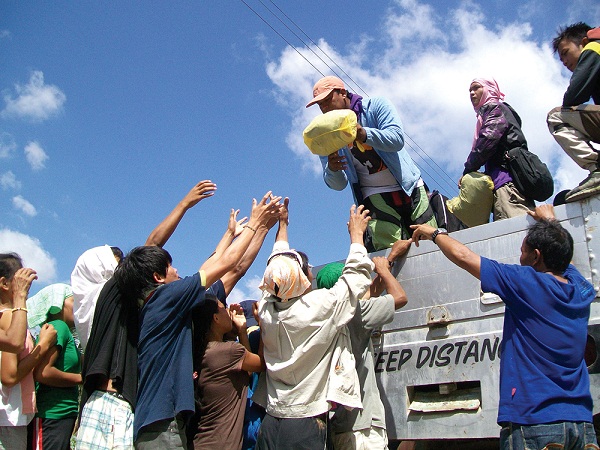
SURVIVORS of Typhoon “Pablo” in New Bataan, Compostela Valley, reach out for relief goods being handed out from a dump truck. FRINSTON LIM / INQUIRER MINDANAO
DAVAO CITY—An alert has been raised for the possible entry of human trafficking syndicates in areas devastated by Typhoon “Pablo” that the head of the social welfare department said are now hunting grounds for traffickers in search of their most vulnerable preys—women and children.
Social Welfare Secretary Corazon Soliman said she sought the help of relief workers in spreading information on human trafficking in areas now suffering from the typhoon’s effects to protect women and children, especially in Compostela Valley and Davao Oriental, the two provinces hardest hit by the storm.
Soliman said the situation was ripe for human traffickers.
“More than the horizontal values, we need to inform them that there is going to be a better way (of surviving),” Soliman said.
Saying her fears are not baseless, Soliman cited cases of women and children who had been trafficked from areas hardest hit by Tropical Storm “Sendong,” which killed nearly 2,000 people in Northern Mindanao last year.
Inorisa Elenito, executive director of the Mindanao Migrants Center based here, said her group had documented three cases of trafficking in Cagayan de Oro shortly after Sendong struck.
One of the victims fell for a nonexistent local job while two were lured to nonexistent jobs abroad, said Elenito.
Cases of trafficking were also monitored in Iligan City, which was also hit hard by Sendong, according to Elenito.
“We do not want this to happen again,” Soliman said. Nongovernment organizations backed Soliman’s campaign.
Patricia Sarenas, former Abanse Pinay representative, said people in communities ravaged by calamities are easy prey for traffickers.
Jeanette Ampog, executive director of Talikala, a group helping prostituted women, said her group has not monitored any case of human trafficking after Typhoon Pablo but agreed that people in devastated communities are vulnerable.
“In disaster areas, people are desperate for food and other basic needs and they can easily fall prey to human traffickers,” Ampog said.
The government and private sector are sending aid to the disaster areas but residents desperate for food have taken matters into their own hands, breaking into food warehouses and taking whatever they could eat.
Several local governments have also come to the aid of the typhoon survivors, like Maguindanao that donated food, clothes and medicines.
Maguindanao was also hit by Typhoon Pablo but its governor, Esmael Mangudadatu, said his province did not suffer as much as Davao Oriental and Compostela Valley.
At least 600 families had been displaced by floods in Maguindanao. “We can’t afford to see our neighbors sick and starving,” said Mangudadatu. Ayan Mellejor, Germelina Lacorte and Charlie Senase, Inquirer Mindanao